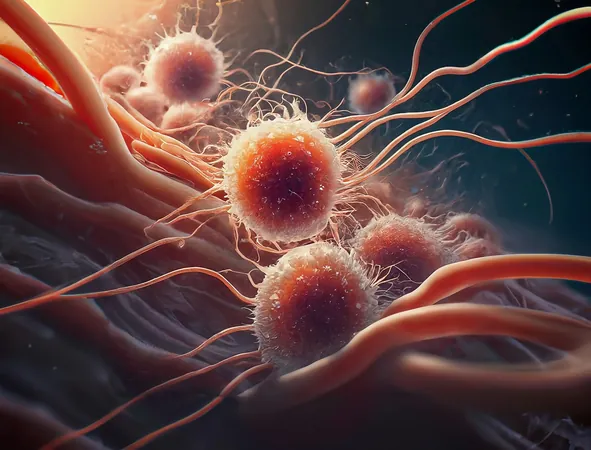
Revolutionary Discovery: Cells May "Learn" Like Our Brains Do!
2024-11-20
Author: Ming
Introduction
A groundbreaking study reveals that individual cells could possess the ability to learn—a trait long considered exclusive to organisms with complex nervous systems. This transformative research, spearheaded by scientists from the Center for Genomic Regulation (CRG) in Barcelona and Harvard Medical School in Boston, challenges the very essence of how we perceive cellular behavior.
Jeremy Gunawardena, a co-author and systems biology professor at Harvard, expressed, "Rather than just following set genetic instructions, cells might engage in basic decision-making processes influenced by their environments." These findings, published in the prestigious journal *Current Biology*, promise to reshape our understanding of biological systems at their foundational level.
The Science of Habituation: Learning Without a Brain
The focus of this study is habituation—a primitive form of learning where organisms stop responding to repetitive stimuli, akin to how humans may eventually ignore a ticking clock or flickering light. While prior studies have documented habituation in animals, researchers have long debated whether such responses also exist at the cellular level.
Historical studies on single-celled organisms like Stentor roeselii revealed behaviors suggesting learning; however, skeptics dismissed these findings. Yet more recent experiments continued to substantiate these claims, highlighting that cells may possess intrinsic mechanisms to adapt to their surroundings.
Rosa Martinez, a fellow researcher at CRG, stated, “For cells to exhibit learning behavior would imply they utilize internal molecular networks performing tasks similar to neuronal networks in brains—a captivating question that warranted an in-depth study.”
Unmasking Cellular "Learning" Through Simulations
Instead of traditional lab work, the researchers opted for computer simulations to decipher the biochemical reactions cells undergo to process environmental information. By recreating scenarios where cells faced repeated stimuli, they discovered learning-like behaviors emerging from their responses.
The study particularly examined two key molecular circuits: negative feedback loops—regulating processes similarly to a thermostat—and incoherent feedforward loops, resembling motion-activated lights with timers, operating both the stimulus and its inhibitor concurrently.
Unlocking Cellular Memories
These simulations highlighted that cells fine-tune their responses over time—an echo of habituation seen in higher organisms. One of the pivotal findings was the concept of “timescale separation,” where certain biochemical reactions occur at different speeds, potentially representing "memory" at the cellular level, allowing for immediate reactions and influencing future responses.
Merging Neuroscience and Cognitive Science
This research bridges a longstanding divide between neuroscientists and cognitive scientists regarding habituation. Some neuroscientists propose that reactivity diminishes with frequent stimuli, while cognitive scientists argue that responses strengthen under intense but infrequent stimuli. The study concludes that both views hold merit, indicating a nuanced understanding of habituation occurring across various circumstances.
Gunawardena noted, "What we have here are two perspectives that are essentially two sides of the same coin, and we believe single cells could be pivotal in studying the essence of learning itself."
Implications of Cellular Learning
Should these findings be verified through further experiments, the implications could be revolutionary. The so-called "memories" cells form could account for phenomena such as cancer cells acquiring resistance to treatment or bacteria becoming immune to antibiotics—showcasing how cells appear to learn from their surroundings to enhance their survival.
Employing mathematical models enabled researchers to rapidly test scenarios, pinpointing those that warranted experimental exploration. This methodological advancement could significantly expedite scientific discoveries while conserving resources.
A New Era in Computational Biology
Martinez emphasized, “The goal is to render biological systems as programmable as computers. However, laboratory experiments can be prohibitively expensive and time-intensive.” Her team at the Barcelona Collaboratorium leverages mathematical modeling to provide insights into substantial biological inquiries.
"This strategy allows us to prioritize experiments likely to yield fruitful outcomes, saving precious time and resources while paving the way for future breakthroughs," Martinez explained.
As this pivotal research unfolds, it could redefine our understanding of cellular capabilities, prompting exciting advancements in both medicine and science. The notion that cells can learn and possibly retain information opens new pathways for unraveling the mysteries of life at the most elemental level.
Is this the dawn of a new era in biology? Stay tuned for further updates on how these discoveries continue to impact the scientific community!




 Brasil (PT)
Brasil (PT)
 Canada (EN)
Canada (EN)
 Chile (ES)
Chile (ES)
 España (ES)
España (ES)
 France (FR)
France (FR)
 Hong Kong (EN)
Hong Kong (EN)
 Italia (IT)
Italia (IT)
 日本 (JA)
日本 (JA)
 Magyarország (HU)
Magyarország (HU)
 Norge (NO)
Norge (NO)
 Polska (PL)
Polska (PL)
 Schweiz (DE)
Schweiz (DE)
 Singapore (EN)
Singapore (EN)
 Sverige (SV)
Sverige (SV)
 Suomi (FI)
Suomi (FI)
 Türkiye (TR)
Türkiye (TR)